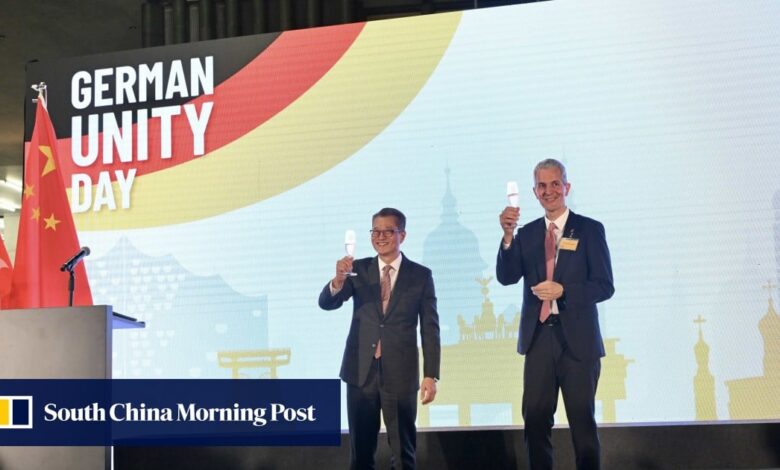German consul general to Hong Kong praises city for openness and ‘fair competition’, looks forward to continuing strong trade relations

[ad_1]
Hong Kong’s German consul general has praised the city for its “open exchanges” and “fair competition” and said he hoped that bilateral economic cooperation would continue.
Stefan Bredohl was speaking on Monday at a celebration to mark German Unity Day, the 1990 reunifcation of the country, and the anniversaries of the country’s consulate general, its Goethe-Institut, and the German Chamber of Commerce in the city.
“And I hope that this will be the basis for our relations in the future.”

Bredohl, also consul general to Macau, added that economic relations between the two sides were “dependent” on Hong Kong maintaining its rule of law system and “international character.”
About 700 people, including German business leaders, residents, and other invited guests attended the commemoration.
“We are for this very pragmatic, open cooperation, and we are looking forward to continuing this economic relationship,” he said.
The speech came as the Hong Kong government works to rebuild its economic relationship with Europe amid heightened geopolitical rivalry between the US and China and Western wariness about investment in Hong Kong.
There were two high-level visits to Germany by city officials in September alone.
Financial Secretary Paul Chan Mo-po wrapped up a landmark 10-day European tour with visits to Berlin and Frankfurt late last month, where he met business leaders to promote the city’s business environment. He also visited Britain and France.
Secretary for Commerce and Economic Development Algernon Yau Ying-wah travelled to Munich earlier in September for a conference to boost economic cooperation between Europe and the Greater Bay Area.
Chan also delivered a speech at the German celebration on Monday night that highlighted 170 years of Hong Kong-German relations and the opportunities for businesses looking to expand into the city market.
Chan said the war between Russia and Ukraine had created a string of problems in Europe.
“As the prevailing geopolitical challenges continue to cast a shadow over the European continent and its economy, German businesses are increasingly interested in seeking opportunities in this part of the world,” he told the gathering.
“German businesses can confidently consider Hong Kong as the landing platform and regional hub.”
Chan discussed Hong Kong’s traditional industries of finance and international trade, but also turned the spotlight on the bid to build the city into an innovation and technology hub.
“There will only be more opportunities for German businesses,” he predicted.
German Federal Foreign Office figures show bilateral trade reached €6.9 billion in 2021, making it Hong Kong’s twelfth largest trading partner overall and largest in the EU.
Hong Kong Census and Statistics Department figures showed 92 German companies had their regional headquarters in the city, and another 332 had regional or city offices.
The city also plays a large role in trade with mainland China, with about 5 per cent of trade routed through the city, the Hong Kong Economic and Trade Office in Berlin said.
Johannes Hack, the president of the German Chamber of Commerce, said the speeches by the consular general and financial secretary “embedded [him] with confidence” at a time of uncertainty.
“The consul general made very clear that Germany and German business is still interested in maintaining its ties with Hong Kong and with mainland China,” Hack said.
He added that the geopolitical environment had created “a great deal of perceptions” about Hong Kong among Germans that were not based on fact.
Hack added he hoped more could be done to engage the German business community.
“We want to engage and we want to remain engaged,” he added.
West Germany and East Germany, which had been in the Soviet Union sphere of influence, reunited on October 3, 1990 after the Berlin Wall that separated the city came down.
[ad_2]
Source link





